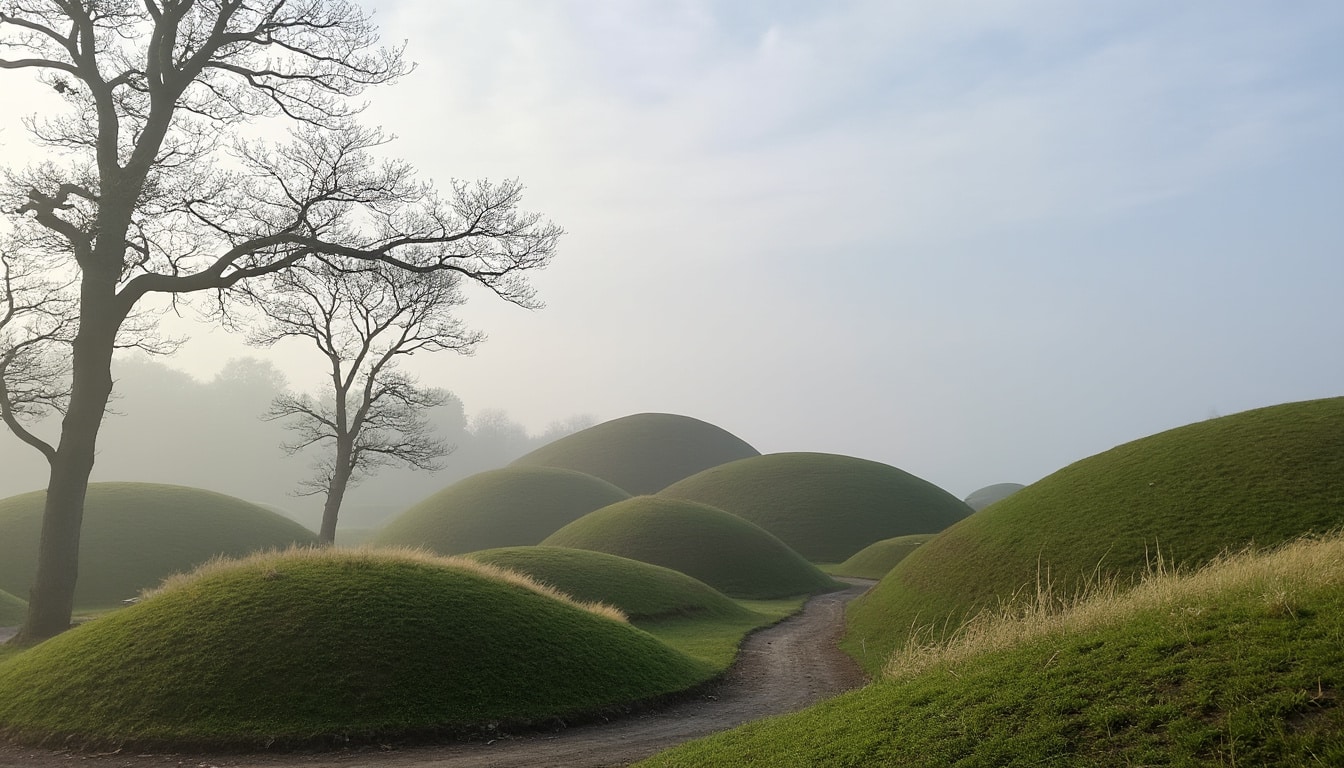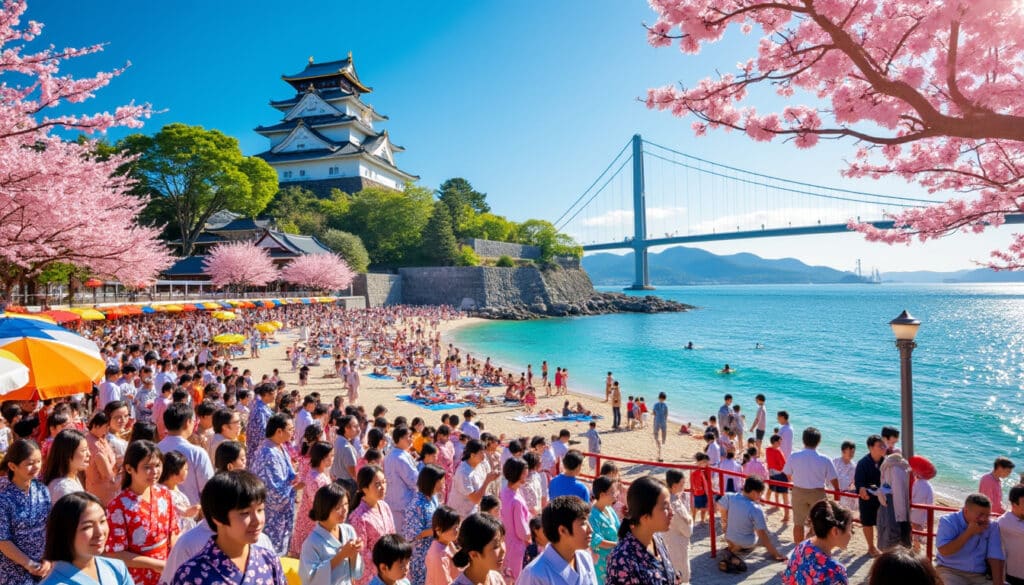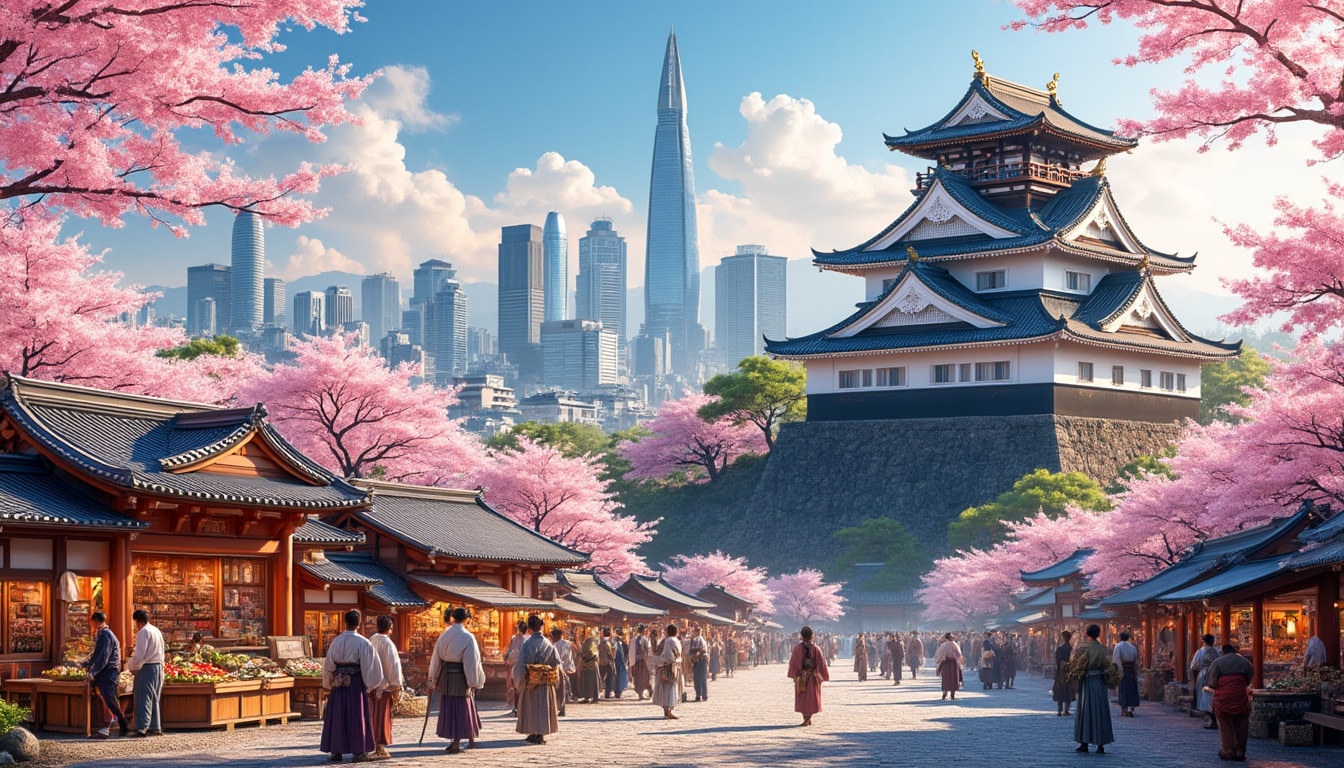Located on the eastern coast of Honshu, Chiba Prefecture stands as a testament to Japan’s rich history and cultural evolution. Nestled in the impressive Kanto Plain, Chiba has been a witness to pivotal moments in time and the lives of millions. From ancient shell mounds to modern industrial expansions, Chiba’s narrative is both diverse and captivating. As the gateway to Japan due to its proximity to Tokyo Bay and the presence of Narita Airport, Chiba has consistently played an essential role as a hub of commerce, culture, and history.
The Ancient Footprints: Tracing Chiba’s Prehistoric and Early History
Chiba Prefecture’s history stretches back to prehistoric times, as evidenced by remnants from the Jomon period found throughout the region. These artifacts reveal that early inhabitants relied heavily on the Pacific Ocean and Tokyo Bay’s rich marine resources. The kaizuka shell mounds, the largest in Japan, stand as silent witnesses to a thriving ancient society. Additionally, kofun burial mounds further demonstrate the area’s significance as a center of historical human activity.

As the Asuka period dawned, the Taika Reform of 654 brought significant administrative changes to present-day Chiba Prefecture. The division of the historical Fusa Province led to the creation of Shimosa Province in the north and Kazusa Province in the south. By 718, Awa Province emerged, marking the south of what is now Chiba Prefecture. These administrative units played vital roles until they were eventually unified under Chiba Prefecture post-Meiji restoration.
The Cultural Landscape During Asuka and Nara Periods
During the Asuka (538–710) and Nara (710–794) periods, the Yamato court began establishing control over these provinces by setting up kokubunji provincial temples. This initiative was part of broader efforts by the central government to centralize and standardize authority, emphasizing the importance of religion in administration.
The evolution over time reflects in the archaeological sites spread across the region, offering insights into the past lifestyle and practices of Chiba’s early inhabitants. These sites not only serve as historical records but as crucial cultural landmarks.
Frequently visited by enthusiasts and students alike, they add to Chiba’s reputation as an educational treasure trove.
The Heian Period: Growth and Feudal Estates
Chiba’s prominence grew during the Heian period (794–1185). As the imperial court extended its reach, the establishment of shōen (feudal estates) across Chiba’s provinces became an economic cornerstone. The fertile lands contributed significantly to the prosperity of the capital in Kyoto through agricultural products and tax revenue.
Paradoxically, as the kokushi (provincial governors) gained military independence, they gradually shifted influence away from the imperial center. This newfound autonomy sowed the seeds for the Chiba clan’s rise to power, playing a critical role in setting the foundation for the Kamakura shogunate.
Soga no Umako, a significant figure associated with this era, left a lasting legacy that resonates in current villages and historic sites. His influence is evident in the local folklore and cultural practices observed today.
Symbolic Heritage Sites
Several architectural structures from the period still dot the landscape, capturing glimpses of a bygone era. The reconstruction efforts have seen places like Nihonbashi Chiba and Chiba Castle receive special focus, offering visitors a peek into medieval Japan.
- Chiba Castle: A famed landmark with historical roots
- Nihonbashi Chiba: A bridge connecting past tales to modern traditions
- Shinto shrines: Spiritual and historical reflections
These sites, alongside many Shinto shrines and temples, are protectors of Chiba’s storied past.
The Meiji Restoration and Modern Periods
The formation of Chiba Prefecture on June 15, 1873, following the merger of Kisarazu and Inba Prefectures, marked the beginning of a new era. This era saw rapid modernization propelled by the Meiji Restoration, aiming to align with global advancements. However, a chilling reminder of nature’s unpredictability arrived with the 1923 Great Kanto earthquake, causing significant damage across the prefecture.
Modernization continued into the 20th century, as Chiba emerged as an industrial powerhouse within the Tokyo-Yokohama metropolitan ring. The Keiyo Industrial Zone, characterized by the production of chemicals, iron, and petroleum products, reflects the dramatic industrial growth.
Chiba’s Economic Expansion
| Industry | Key Products | Location |
|---|---|---|
| Petroleum | Fuel, Lubricants | Keiyo Industrial Zone |
| Chemicals | Pesticides, Plastics | Keiyo Industrial Zone |
| Agriculture | Rice, Vegetables | Inland Farms |
This industrial epicenter fuels not only Japan’s economy but also fulfills essential roles in the global market.
Cultural and Economic Hub: Chiba in the 21st Century
Today, Chiba stands as a vibrant conurbation, evidencing a seamless blend of historic grandeur with modern-day marvels. Hosting Chiba Marine Stadium, Chiba Port Tower, and Narita Airport, the area serves as a pivotal cultural and economic hub on the global stage.
As the commercial heart, Chiba City continues to flourish with various cultural spaces such as the Chiba Prefectural Museum, which showcases the rich tapestry of local art and history. The region boasts significant educational and research institutions, reinforcing its standing in academic and scientific circles.
Lifestyle and Cultural Influence
Chiba remains deeply connected to its traditions while embracing modern lifestyle dynamics. Festivals, modern arts, and theatre add vibrancy to the city’s cultural calendar. Meanwhile, natural parks like Mizumoto Park invite families and visitors, offering leisure amidst natural beauty.
- Chiba Marine Stadium: A major sports venue 🏟️
- Chiba Port Tower: Offers stunning cityscapes 🌆
- Various Museums: History meets modernity at every corner 🏛️
Exciting initiatives promise to ensure Chiba remains a focal point of culture, lifestyle, and innovation in Japan.
FAQ Section
Here are some frequently asked questions about Chiba:
- What is Chiba Prefecture known for? Chiba is renowned for its rich history, modern industrial zones, cultural sites, and major transportation hubs like Narita Airport.
- How did Chiba Prefecture form? Chiba Prefecture was created in 1873 by merging Kisarazu and Inba Prefectures during the Meiji Restoration.
- What cultural sites can one visit in Chiba? Visitors can explore Chiba Castle, various Shinto shrines, and the Chiba Prefectural Museum, alongside modern attractions like the Chiba Marine Stadium.
For further insights into Chiba’s vibrancy, one can explore its rich array of food, culture, and dynamic daily life on various platforms, providing a deeper appreciation of its heritage and development over millennia.

Fun Facts & Curiosities About Chiba
🌟 Nestled on Japan’s eastern coastline, Chiba Prefecture is a hidden gem in the Land of the Rising Sun. Known for its rich blend of history, culture, and breathtaking landscapes, Chiba is more than just Tokyo’s neighbor. It offers captivating…

Architecture and urban features of Chiba
As a bustling city located just east of Tokyo, Chiba offers a rich tapestry of urban design and architecture that reflects both its historical legacy and modern innovations. The city boasts a diverse array of structures, from historical castles to…

Chiba is a fascinating prefecture that offers a unique blend of urban conveniences and natural beauty, nestled in proximity to the bustling metropolis of Tokyo. While it may not be as internationally renowned as its neighboring capital, Chiba has carved…

Demographics and geography of Chiba
Chiba, a vibrant prefecture situated in the heart of Japan, offers a fascinating glimpse into the interplay of population dynamics and geographic diversity. With its unique position neighboring Tokyo and extending to the Pacific Ocean, Chiba’s demographic landscape is continuously…

Holidays and celebrations in Chiba
Chiba, a captivating blend of tradition and modernity, offers a unique cultural tapestry through its rich holidays and vibrant celebrations. From traditional matsuri (festivals) that honor historical roots to contemporary extravaganzas that light up the night sky, Chiba’s festivities capture…

Language and spelling of Chiba
Chiba, a vibrant prefecture bordering Tokyo, is not only a hub for tourists, but also for linguists interested in the interplay of language and culture. As an example of modern Japan, Chiba showcases an intriguing blend of traditional and contemporary…

Local tips for tourists in Chiba
Chiba Prefecture, located just east of Tokyo, is renowned for its major international gateway, Narita Airport, but it holds many hidden treasures that offer a blend of both urban and rural experiences. From the enchanting allure of Tokyo Disney Resort…

Names, flags, and identity of Chiba
Chiba Prefecture, located on the eastern edge of Japan’s Honshu Island, is a region filled with vibrant history, cultural symbols, and distinct identity markers. Understanding Chiba requires delving into its rich tapestry of names and flags that symbolize its journey…

Reputation and identity of Chiba
Chiba, nestled in the vibrant Kanto region of Japan, boasts a distinct blend of tradition and modernity. As one navigates the cityscape, they’re greeted with an eclectic mix of the ancient and the new, where historic landmarks harmonize with cutting-edge…

Understanding the intricacies of time and time zones in Chiba, Japan, is essential for travelers and residents alike. Chiba, a vibrant city nestled close to Tokyo, operates on Japan Standard Time (JST), which is 9 hours ahead of Coordinated Universal…

Unusual facts and social issues in Chiba
Chiba Prefecture, nestled in the Kanto region of Japan, offers a treasure trove of unique facts and multifaceted social issues, making it a fascinating area of study. This vivid prefecture is known for its blend of lush greenery and bustling…

What does Chiba look, smell, feel like?
Chiba Prefecture, nestled next to the bustling metropolis of Tokyo, offers an intriguing mix of urban sophistication and rural charm. This Japanese region is renowned for its vibrant landscapes, rich history, and diverse attractions, making it a fascinating destination for…


